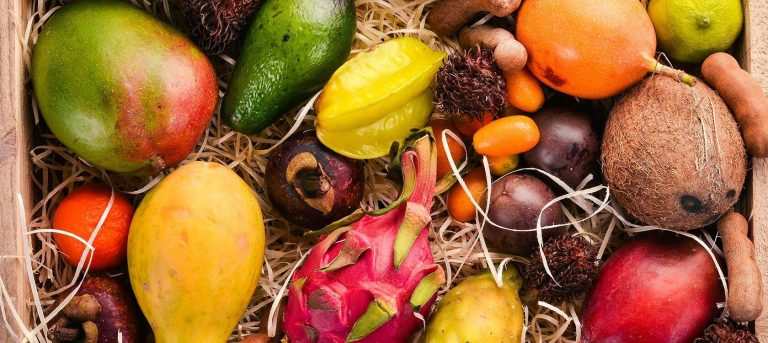Exotic fruits are part of the standard range of every supermarket. Here’s why you should avoid the sweet tropical fruits.
You can buy pineapple, mango and Co. at relatively low prices in almost every German supermarket and discounter. A central ecological problem of the exotic fruits is obvious: the plants come from tropical areas. Accordingly, the fruits are grown in distant countries and imported to Germany. They have to cover long transport routes and consequently have a bad ecological balance.
The CO2 emissions caused by transport get into the atmosphere and continue to drive global warming there. But the contribution to the climate crisis is not the only downside of tropical fruits.
Exotic fruits: list

The following types of fruit are among the best-known tropical fruits that you will find in German supermarkets:
Acai
acerola
pineapple
avocado
bananas
dates
figs
goji berries
pomegranate
guava
jackfruit
persimmon
prickly pear
star fruit / carambola
kiwi
lychee
mango
mangosteen
papaya
Passion Fruit / Maracuja
Pitaya / dragon fruit
Tamarillo / Tree Tomato
tamarind
Exotic fruits: monocultures and pesticides
Farmers grow many exotic fruits in monocultures. This not only damages the structure of the soil, but also makes the plants more susceptible to pests. Farmers are therefore increasingly relying on chemical-synthetic pesticides. Many of these pesticides are suspected of being carcinogenic. Occupational health and safety measures are often neglected.
Machines sometimes still spray the environmental toxins when workers are still in the field. In doing so, you regularly come into direct contact with the harmful substance. And even without direct skin contact, there can be health consequences: according to Deutschland Funk Kultur, harmful pesticides are regularly sprayed in large quantities on pineapple plantations in Cartagena, a port city in Costa Rica. As a result, students in a school near the plantations regularly complained of headaches, skin rashes, diarrhea, nausea and vomiting.
Scientists confirmed that the pesticides were not only found on the plantation itself, but also in dust, hair from livestock and human saliva, among other things, and could be detected.
Rainstorms also ensure that pesticides are flushed from the plantations into water bodies. There they harm animals and plants and ultimately contaminate the groundwater. In communities around the plantations, it is therefore extremely dangerous to health to drink water from the tap.
It is not uncommon for rainforest areas to be cleared for plantations or sensitive ecosystems to be invaded. This promotes the extinction of species, as many animal and plant species lose their habitat.
Tropical fruits: working conditions on plantations
In addition to a lack of occupational safety, there are other labor and human rights violations on tropical fruit plantations. According to an Oxfam report reporting on the cultivation of bananas and pineapples in Ecuador and Costa Rica,…
Employers deliberately do not inform their workers about their rights.
some employees do not receive a copy of their employment contract.
workers have to work up to twelve hours at a time on the plantation to receive the daily minimum wage, which actually applies to an eight-hour day.
pregnancy is often a reason for dismissal without notice.
Employees usually have no social security.
immigrants who do not yet have their own apartment and work in the fields have to live together in a very small space.
Employers do not offer medical care in the event of pesticide poisoning or work-related accidents.
Exotic fruits at cheap prices
Precarious working conditions, environmental toxins, deforestation and long transport routes are behind the relatively inexpensive exotic fruits in European supermarkets. Or in short: exploited people and an exploited nature.
According to Oxfam, German supermarkets should take responsibility for these abuses. After all, it is the German corporations that want to keep lowering the price from suppliers in order to be able to score points with customers with cheap prices. Farmers in the country of origin have to bow to this aggressive price policy.
You can do that!

In order not to support the abuses surrounding the cultivation of exotic fruits, you as a consumer can use:in your purchasing power:
It is best if you eat tropical fruits in moderation. For a good ecological balance, you should prefer regional and seasonal fruit varieties. You can find out which fruit is available when from German cultivation in our seasonal calendar.
Pay attention to organic certified goods when buying! In this way you can be sure that farmers have avoided chemical-synthetic pesticides during cultivation. Seals with particularly strict requirements are Demeter and Naturland.
When buying, also look for trustworthy seals that guarantee compliance with ecological and social standards. You should not only pay attention to the organic, but also to the Fairtrade seal.
Fruits with the Rainforest Alliance seal are also subject to far-reaching social and ecological requirements. Although the seal with the green frog cannot quite keep up with the strict Fairtrade seal or the EU organic seal, it still stands for high social and ecological standards.

